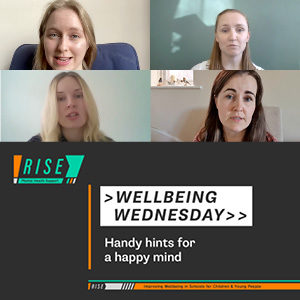
A successful mental health team is finding new ways to support children and teachers with the challenges of Covid-19.
The RISE team, which normally works with children in local schools, quickly rose to the challenge of lockdown, offering a whole range of new options for children needing their support.
Instead of assemblies, group work and one-to-ones in school, the team switched to telephone and online consultations, as well as keeping in touch with parents and schools to monitor the young people’s changing needs. A new series of ‘Wellbeing Wednesday’ videos and other resources are also helping families with children who may have worries during the outbreak.
And with more children now back in school, the team is looking further ahead.
Fiona Goldsmith, the RISE team’s clinical lead, said: “It’s always important to help children with their wellbeing, but it’s even more important in these changing times. We’re here to help anyone with worries, but a lot of our focus now is on prevention.
“By working with schools, we can help children who are likely to be vulnerable, rather than waiting until they are back in school to manage any difficulties. Adapting to lockdown was a challenge, but returning to school will also cause anxiety for some children.
“We have always focused on the whole school, and this is more important than ever, as many teachers and school staff are also experiencing anxiety. So a big part of our work is to support staff through all the changes, help them to be resilient, and be there for their pupils.”
The RISE project was set up last year, after Newcastle Gateshead was one of only 25 areas chosen to provide extra help in schools through the national Trailblazer programme.
Since then RISE has trained 12 local people as education mental health practitioners, and helped over 600 children in 54 schools in Newcastle and Gateshead.
The team helps young people with a range of issues like difficult relationships, loneliness, school work pressures and coping with change.
Linking with school counsellors, nurses, educational psychologists and voluntary organisations, its focus is on supporting pupils with mild to moderate mental health issues, as well as helping pupils with more severe needs to get the right support.
Emma Youd, one of the team’s Education Mental Health Practitioners, adds: “School is always a mix of positive and challenging experiences, but during the pandemic it’s more important than ever to help them build up resilience and coping strategies.
“It’s important for children who are not in school, the pupils who have been attending through the pandemic and for everyone as they eventually return to what’s likely to be a very different school environment.
“Our support is focused very much on the needs of the children, families and schools, helping with concerns like anxiety, self-esteem or low mood.”
RISE is supported by Cumbria, Northumberland, Tyne and Wear NHS Foundation Trust (CNTW), NHS Newcastle Gateshead Clinical Commissioning Group (CCG) and Northumbria University, as well as Newcastle and Gateshead councils. The team is aiming to expand and support a wider range of schools in the future.
You can find out more about RISE, including a list of schools currently supported by the team, at www.rise-ne.co.uk.
If you or a member of your family need support with anxiety or mental health worries, you can contact the team at [email protected].
